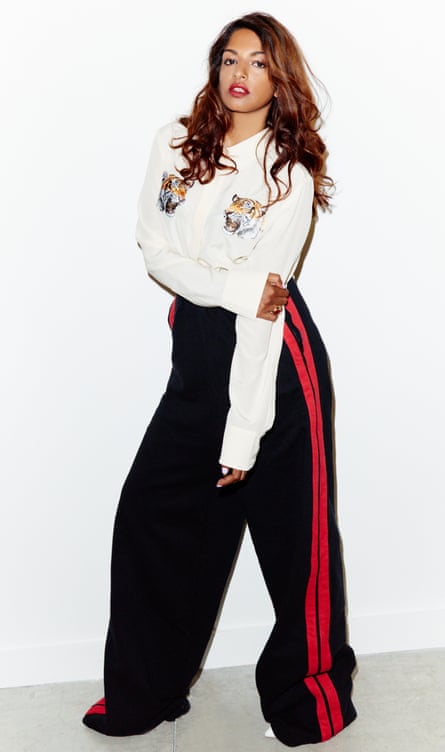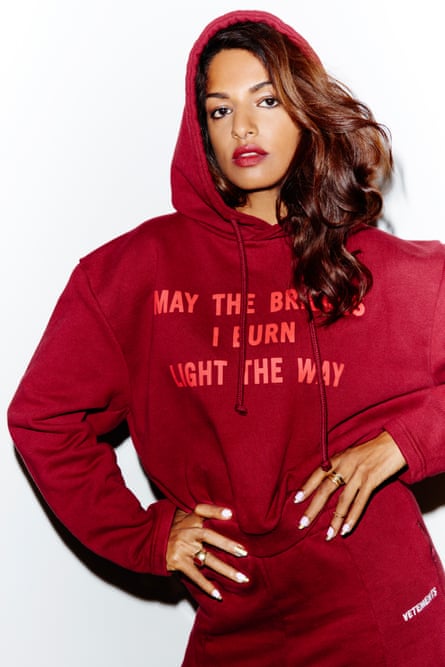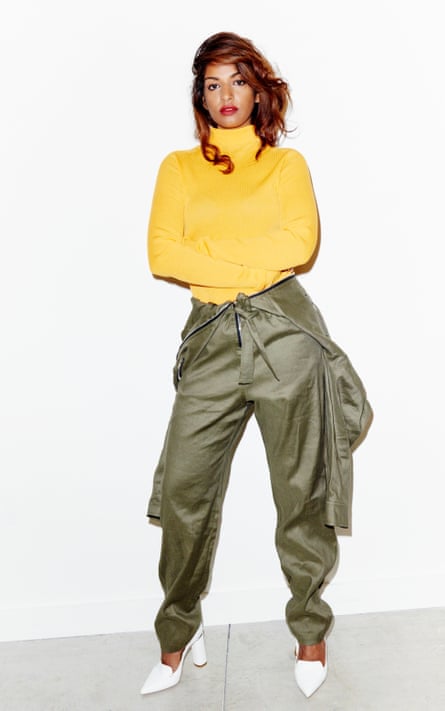It is lunchtime in east London. In a studio not far from her home, Maya Arulpragasam, the 41-year-old British-Sri Lankan who makes music as MIA, sits on a low sofa, her leather boots set apart and yellow-flared legs spread, better to arch over a plate of food. Arulpragasam’s hair is dark and wild and hangs down in tangles over a tight white T-shirt that the musician says is on loan from her six-year-old son. She is just back from Himalayan India, there for a month to direct a music video that will accompany the release of her new album, AIM. While she eats, Arulpragasam tells stories about her trip. The time airport police in Delhi almost shot her. The time she argued with a production manager, in Leh, and threatened to burn his house down.
Arulpragasam’s manager, Genneah Turner, sits on the sofa listening. She hasn’t seen her client for weeks. When Arulpragasam finishes telling an anecdote about disagreeing with a local physician’s treatment of her altitude sickness, Turner interrupts to ask about the apparent lack of internet in northern India. How else to explain all the important business emails that Arulpragasam failed to reply to over a month? “Seriously,” the musician insists, chewing food, “the internet wasn’t working where we were.”
Turner wonders, gently, how other people on the same trip were able to Instagram so much of it. Arulpragasam, smiling coolly at her plate, says she can’t explain that. “Maybe something went wrong with my phone?”

Those who’ve followed her career, since she first emerged as MIA in 2003, will be well aware Arulpragasam has a testy relationship with authority. Across a month in India she managed to threaten a disobliging colleague with criminal arson and, at Delhi airport, provoke police into reaching for their guns. Across a decade in pop she has been vexatious, cheeking powerful peers (Madonna, Beyoncé) as well as influential tastemakers (MTV, New York Times, Google), meanwhile live-Tweeting more detail about the private disputes with her American record label (Interscope) than anybody there can be comfortable with. “I talk talk talk,” she raps on her new album, accurately, “until I piss ’em off.”
Her lunch finished, we walk to a nearby park, where Arulpragasam lists for me all the managers she’s chewed through since 2003. One left inside a week, she recalls. One manager departed because of the Super Bowl – that infamous occasion, in 2012, when MIA joined Madonna on stage as part of the event’s halftime show and, during some very limited time on screen, managed to flip an unchoreographed middle finger at 167 million viewers. “I’ve had 13 managers in 13 years,” she says, claiming that one of them has since become her boss at Interscope.
Arulpragasam triangles her legs, teddy bear-style, and puts her hands out behind her on the grass. “So there’s some bridges I’ve burned,” she says.
We talk about AIM, a curious and appealing muddle of a record that has much of the snarl fans have come to expect from MIA, but an unfamiliar gentleness, too, its softer underbelly most evident in an autobiographical track called “Survivor” and in the new single “Freedun”, its chorus sung by Zayn Malik, one-time glowerer of One Direction. Arulpragasam says the album’s sweeter parts were written after a break-up with a boyfriend late last year. “In my head this is like the love album,” she says. “It’s a cute album, My Little Pony, compared to what I usually make.”
That’s going too far. At least half the tracks sound as if they were written in MIA’s customary battle-crouch, and the album’s thorniest work, “Borders”, inspired by the Syrian refugee crisis, was recently the subject of a mean little row between her and MTV. She directed a video for “Borders” last year that featured an image of a boat-load of dead refugees. The film was politically timely, affecting and well praised, but when it was left off the list of nominations for an MTV video music award, Arulpragasam took to Twitter to laugh bitterly (“#hahahahhaahahhaha!!”) and to accuse the media company of being prejudiced against her subject matter.

In conversation she suggests the lack of an MTV nomination amounted to a form of censorship. She says: “If you have a music industry that’s so ingrained with the political agendas of the time that you censor art like that…” When I suggest another possibility, that MTV didn’t think the video was one of the year’s best, she answers: “You can think it’s my paranoia. And you can write that, say: ‘Oh, yeah, MIA, she was super-paranoid about all these people doing all these things, but that’s not true, [her video] was just rubbish.’ You can write that.” But she says she wants her own suspicions registered, too. “If it’s political, then people have the right to know.”
Her war with MTV is actually one of the more manageable conflicts currently occupying her. There is a song on the new album called “Visa” that takes aim at American immigration policy, something Arulpragasam unwillingly knows a lot about. Her application to renew an expired visa has been stuck in mysterious bureaucratic limbo since 2014. In an age when British popstars with any sort of US fanbase are routinely granted permission to work in America, her two-year hobbling seems unconventional. “Obviously what’s happening to me is very deliberate,” she says. “I don’t know who’s doing it, it’s like fucking playing Cluedo.”
She says she has a few theories as to what’s going on – a few of the bridge-burnees from her past who she worries might be exerting influence. Arulpragasam keeps a Tinker Tailor Soldier Spy-style list in her head, identifying potential enemies, obstructors. “Is that weird?” she asks me.
Um.
“Well shit happens. It is what happens.”
A few of her presumed obstructors cannot be named here for legal reasons. In general, though, she does not pitch her suspicions small. “On paper I’ve supported WikiLeaks and stuff. And now Hillary Clinton is running for president. And until that’s solved I might have a problem, because anyone who ever associated with that website is going to get fucked up. Even if you delivered [WikiLeaks] their takeaway, you are going to be on a list. Do you know what I mean?”
I ask her if she ever worries she’s paranoid and she replies, smartly, that in the aftermath of Edward Snowden’s revelations about the NSA it’s wrong “to even use the word ‘paranoia’ as if it’s a weird condition. Because it’s common as a fucking cold now. Everyone has to have an element of paranoia.”
She reaches for her phone – “I would love to not show you this” – and calls up a screengrab she’s been keeping for months. Last spring, Arulpragasam was removed from the billing of London’s Afropunk festival, after making controversial comments in an interview with the Evening Standard about Beyoncé and Kendrick Lamar, and their involvement in the Black Lives Matter movement. (“Would Beyoncé or Kendrick Lamar say Muslim Lives Matter? Or Syrian Lives Matter?”) The decision that she wasn’t going to perform was reported widely. Oddly, one of the US Embassy’s social media feeds retweeted the news.
Arulpragasam, screengrabbing, interpreted this as a foreign government’s approval of her difficulties. “If they care about you getting dropped off a festival,” she says, “that’s not really paranoia, that’s there.” She puts away her phone. Then, without any preamble, she starts a long and involved story about the summer she thought the CIA might be threatening to assassinate her…

It’s no great mystery where this inclination to mistrust comes from. Arulpragasam tracks it back to the example of her father, an activist who in the 1970s and 80s was a prominent protester against Sri Lanka’s ruling Sinhalese government. He campaigned for an independent state for the minority Tamil population, and Arulpragasam recalls that when she was young her father used to tell her to write letters as if someone was reading them over her shoulder. “From day one he was like that,” she says. When civil war broke out in Sri Lanka in 1983, Arulpragasam, aged six, was moved with her mother and siblings to India while their father stayed behind. When she was 10, they arrived in the UK, the family housed as refugees in London.
On her new album track “Survivor”, she raps in reference to this period: “I arrived through the sea like a pirate.” For a time the young pirate struggled to fit in. Arulpragasam recently unearthed an old family photograph, and laughing over it today she wonders at her rounded Princess Di hair, her primly buttoned-up shirt. At that age, “When I gave my seat to old ladies on the bus, they used to reply: ‘Aren’t you a nice little boy?’” Slowly she found a place for herself as an artist. The go-to person at school for freehand drawings, she went on to Central Saint Martins art college. In her 20s she put on visual art shows, made clothes and might have made a film, had anyone funded a documentary she was trying to make about life in Sri Lanka. Her music was encouraged by a friend, Justine Frischmann, then the lead singer in Elastica. Frischmann loaned Arulpragasam one of the band’s synthesisers and she began to write tracks on it.
Nobody really knew what to make of her early output as MIA, she recalls. Her stuff was a bit hip hop, a bit dancehall, a bit funk... multi-generically odd in a way that her collaborator and then-boyfriend, Wesley “Diplo” Pentz, urged her to embrace. She remembers practical difficulties, though, getting studios and suppliers to accept oddity. “I told them: ‘If you don’t know the genre, just put me near the till. You know the lollipops, next to the till? That is me.” If distributors were wary, the music press took to her immediately (that back-story!) and the debut studio album that came in 2005, Arular, was a critical hit, nominated for a Mercury prize.

Arulpragasam was in her late 20s, and impatient. Against the advice of her then-manager (they split) she moved to the US. “Kids in America were downloading my MP3s. It was the country where George Bush was, where shit was happening. I wanted to go.” Her relationship with Pentz ended and Arulpragasam later suggested this was due to her growing embrace by the mainstream. She signed to Interscope, a subsidiary of Universal, and had meetings with Kanye West and Timbaland. After the release of her second album, Kala, in 2007, and its high-charting single “Paper Planes” in 2008, the rope properly lifted and MIA became an industry darling. She gigged at the Grammys with Jay-Z, was nominated for an Oscar, and even “married into the music industry” – Arulpragasam’s words to me – when she got together with Ben Bronfman, grandson of the CEO of Warner Music. The couple had a son together, Ikhyd, in 2009.
Remembering this period of prominence, Arulpragasam says to me: “When I came [into the spotlight], I came with all my complications.” The complications started to tell around 2010, when she rowed in blockbuster fashion with the New York Times over an unflattering profile, and ended up publishing the writer’s personal phone number online. In another 2010 interview she stated her belief that Google was a stooge company for the CIA, and via her intermittently written blog she got so deep into a war of words with a Sri Lankan rapper called DeLon that it led to accusations of her being a terrorist sympathiser. Her third album, 2010’s Maya, sold a fraction of her big-hit second. After the Super Bowl fiasco in 2012, a messy compensation claim followed her around for months. She came to believe her fourth album, 2013’s Matangi, her lowest-seller to date, had been “buried” by her own record label, because of all the trouble she’d caused them.
“Stars come and go / just like every empire,” she raps on her new album. Complicated as she was – as she is – Arulpragasam was never likely to have an endless career as a mainstream star. She seems relaxed about this, clearly more comfortable as a fringe-dweller, as someone who has talked, talked, talked and finally pissed them off.
But the visa thing rankles. Arulpragasam recalls for me her last visit to the US, a brief trip to deliver her son to his father. “I flew there to drop him off and flew back the same day.” Arulpragasam explains that when she and Bronfman separated in 2010, she decided to move back to London to be near her mother. Tomorrow, Arulpragasam says, Ikhyd will arrive back in the UK from a month away with his paternal family. “We went through a lot to sort that out. It’s kind of like that’s when he gets taken away to get Americanised – he goes and does all his ‘Heeeey! Awesome! America!’ stuff, and I’ve just got to let it happen.”
When she talks about Ikhyd I understand that her battle over the visa amounts to more than just a rebel’s habitual prickliness at being told no. Arulpragasam is the mother of a dual-nationality child, reasonably appalled that whenever she sees him off a plane at JFK she cannot follow. “It’s fucked up. You can have a half-American son and they won’t let you in. So if anything happens to him… Y’know?”
We stay quiet, leaving this worst-case scenario unexplored. Arulpragasam isn’t much of a moper, though, and soon she is rascally chuckling. She still has one or two friends with influence, she says, and the other day she sent a text to Rihanna. Arulpragasam wanted to know if, in a pinch, her friend would help get her over the border. Perhaps via tunnel, “some weird El Chapo move” from Mexico. Or maybe in the boot of a car? The reply came back quickly. “Yeah bitch,” Rihanna wrote, “you know I would.”
MIA’s new album AIM is out now on Interscope/Polydor

Comments (…)
Sign in or create your Guardian account to join the discussion